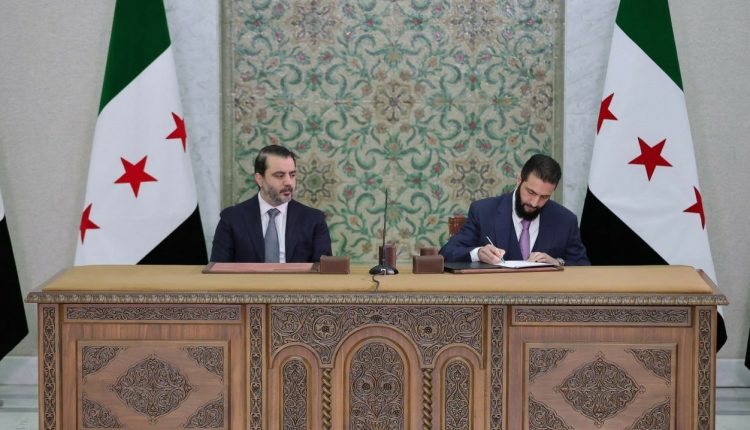Syrian Interim President Ahmad al-Shara Signs Constitutional Declaration
By Kardo Roj
DAMASCUS, Syria (North Press) – Syrian interim President Ahmad al-Shara signed the constitutional declaration on Thursday, a significant step in the country’s transitional phase following years of conflict and political instability.
After receiving the final draft of the document, al-Shara stated, “We hope this will be a new beginning for the Syrian people—one that replaces ignorance with knowledge and suffering with compassion.”
The signing came as the Constitutional Drafting Committee announced the completion of its work, asserting that the document’s legitimacy stems from a collective desire to build a new Syria based on governance, rights, and national unity.
Key Provisions of the Constitutional Declaration
The document introduces fundamental principles aimed at shaping Syria’s governance and legal framework during the five-year transitional period. Some of the most notable provisions include:
Complete separation of powers between the executive, legislative, and judicial branches.
Freedom of speech, press, and expression is explicitly protected.
Protection of private property and women’s rights in education and employment.
Commitment to national unity, ensuring respect for cultural diversity.
Islamic jurisprudence (fiqh) as the primary source of legislation.
Parliament’s authority to summon and question ministers.
Judicial independence and the authority of judges.
President’s powers subject to parliamentary oversight, including provisions for removal or limitation of authority.
Dissolution of the existing Constitutional Court and establishment of a new judicial framework.
State of emergency regulations, requiring approval from the National Security Council and parliamentary approval for extensions.
Parliamentary authority over legislation, while the president holds executive power.
Formation of a new committee to draft a permanent constitution.
Commitment to human rights treaties previously signed by Syria.
President must be Muslim.
Parliament members to be appointed by the president until a permanent constitution is adopted.
Equal rights and duties for all citizens, without discrimination.
Transitional justice mechanisms to ensure accountability, victim redress, and honoring martyrs.
Arabic as the official language of the state.
A Turning Point for Syria?
The signing of the constitutional declaration marks a critical moment in Syria’s political transition. While some observers view it as a step toward institutional reform, others remain skeptical about the balance of power within the transitional government.
The document’s emphasis on human rights, governance, and judicial independence has been welcomed by some civil society organizations, while the role of Islamic jurisprudence and presidential authority over parliament have sparked debate among political analysts.
As Syria navigates this transition, the implementation of the constitutional declaration—and eventual drafting of a permanent constitution—will be closely watched by both domestic and international actors.

